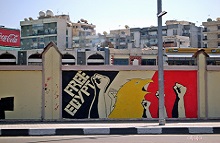Hoezo Arabische lente? Een paar weken geleden leek het daar een beetje op, maar nu dreigt de zomer te worden overgeslagen en belandt de Arabische wereld regelrecht in de herfst.
In Egypte rommelt het alweer. Christenen en moslims gaan op de vuist, vrouwen werden van het Tahrirplein verjaagd, en de jeugd vindt dat het leger te weinig wil hervormen. In Jemen blijft president Saleh op zijn post en onderdrukt de opstand met alle middelen. En in Libië lijkt Moammar Kadafi aan de winnende hand.
De les voor regionale heersers is, dat het niet loont om toe te geven aan opstandelingen. Ben Ali van Tunesië en Moebarak van Egypte moesten het veld ruimen. Andere leiders voeren de repressie op en zitten nog in het zadel.
Bovendien brengt hun vertrek, althans op korte termijn, weinig soelaas. De opstanden begonnen uit onvrede over het perspectief van de jeugd op werk, welvaart en vrijheid. Maar revoluties tasten de welvaart en politieke stabiliteit per definitie nog verder aan, waardoor de onvrede verder toeneemt. Een neerwaartse spiraal.
De les voor het westen is dat partij kiezen risicovol is en dat spreken over lentes voorbarig is. Stijgende olieprijzen lijken nu te duiden op een lange periode van instabiliteit. Italië vreest voor anderhalf miljoen Libische vluchtelingen.
De grootste zorg is niet Libië, maar Bahrein, waar de koning gesteund wordt door troepen uit de Verenigde Arabische Emiraten en Saoedi-Arabië. Die troepen worden tegen de sjiitische opstand ingezet en zijn een signaal in de richting van Iran. Dat land claimt Bahrein en heeft sympathie voor de opstandelingen. Als Bahrein valt kan de Amerikaanse Vijfde Vloot tot de aftocht worden gedwongen, loopt Saoedi-Arabië en daarmee de olievoorziening groot gevaar, en wordt de Iraanse macht vergroot. Het westen wordt dan de grote verliezer in de regio.
De eerste signalen daarvan zijn overigens al zichtbaar. Ondergesneeuwd door het nieuws uit Japan kwam uit Libië het bericht dat Kadafi aan China en Rusland gevraagd heeft de olieproductie op gang te brengen, nu de westerse oliemaatschappijen hun personeel hebben teruggetrokken. Libië heeft slechts vier procent van de wereldolievoorraad, maar het signaal is duidelijk: Kadafi wil van de westerlingen af die de opstandelingen steunen.
En als Bahrein valt, al dan niet door toedoen van Iran, raakt het westen ook daar zijn invloed kwijt. Als de onlusten vervolgens overslaan naar Saoedi-Arabië, waar nu reeds in het olierijke oosten wordt gedemonstreerd, zijn de rapen echt gaar.
Nu de lente lijkt over te gaan in de herfst, zijn de gevolgen voor Europa, dus ook voor Nederland, onzeker. Een olieprijs van 200 dollar per vat is niet irreëel. Een aanhoudende crisis in de Arabische wereld zal effect op ons prille economische herstel hebben.
Het wordt daarom tijd het debat over de crisis in de Arabische wereld over een andere boeg te gooien. Hoe kunnen wij de leveringszekerheid van olie op korte termijn garanderen en hoe komen wij op langere termijn van onze olieverslaving af? En wat wordt onze politieke opstelling? Vermoedelijk vallen we terug op de oude wijsheid van Bertolt Brecht: ‘Erst kommt das Fressen, dann kommt die Moral’.
Trouw






